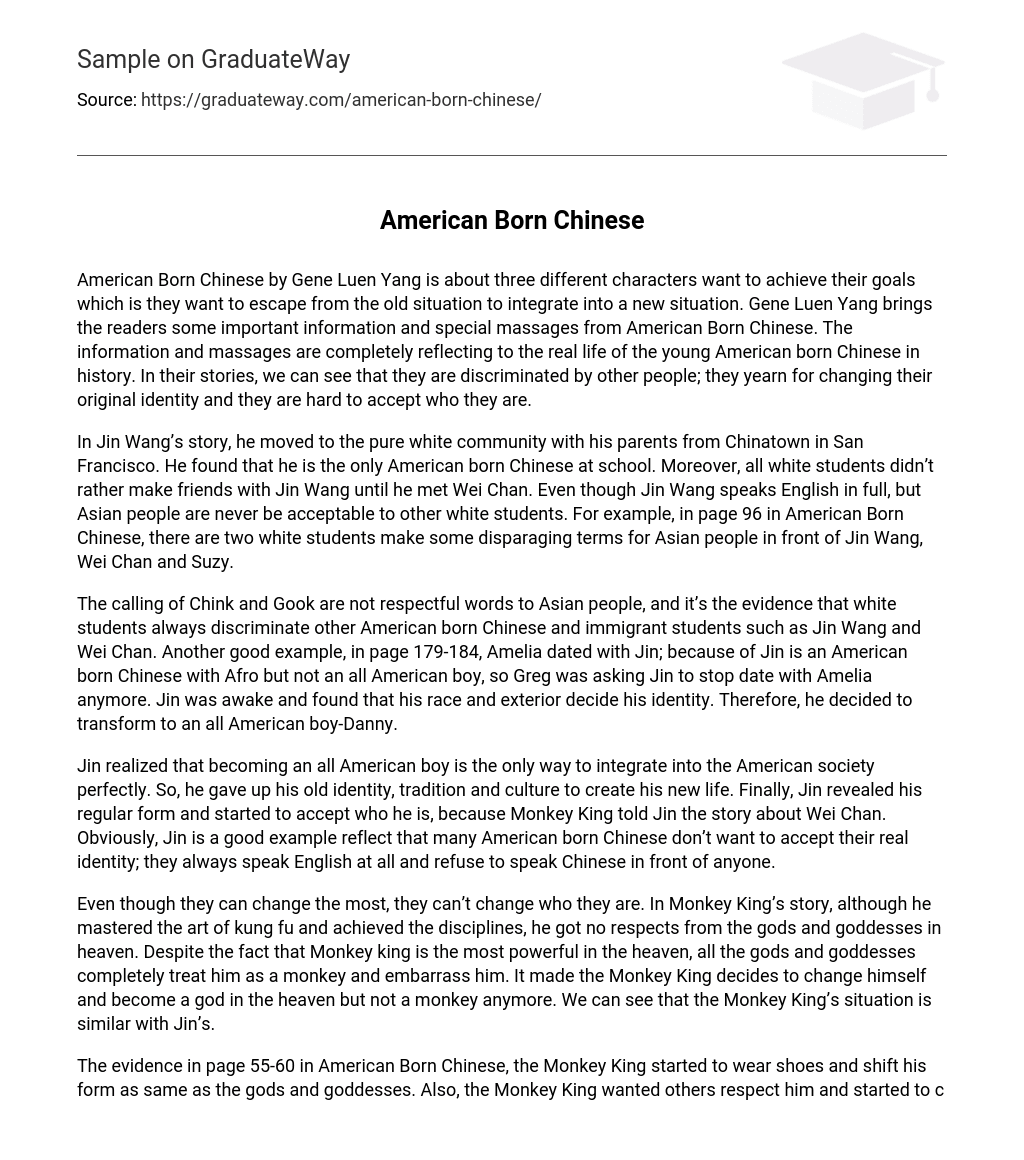American Born Chinese by Gene Luen Yang tells the stories of three characters who all desire to escape their current situations and assimilate into new ones. Yang effectively conveys important messages that are relevant to the experiences of young American born Chinese individuals throughout history. The characters in the book face discrimination, struggle with their identity, and grapple with self-acceptance.
In his story, Jin Wang and his parents moved from Chinatown in San Francisco to a predominantly white community. Jin soon discovered that he was the only American born Chinese student at his new school. The white students at the school were hesitant to befriend him, until he met Wei Chan. Despite Jin’s fluency in English, the white students still didn’t fully accept him or other Asians. A specific instance of this occurs on page 96 of American Born Chinese, when two white students make derogatory remarks about Asians in front of Jin, Wei, and Suzy.
Using derogatory terms like “Chink” and “Gook” towards Asian individuals is disrespectful and it showcases the discrimination faced by both American-born Chinese individuals like Jin Wang and immigrant students like Wei Chan. This discrimination is evident in the experiences of characters like Amelia and Jin, where their relationships are hindered because Jin’s identity as an American-born Chinese with Afro features rather than an all-American boy is questioned by others, namely Greg. This leads Jin to realize that his race and appearance dictate his sense of self, prompting him to transform into an all-American boy named Danny.
Jin came to the realization that fully assimilating into American society meant becoming an all American boy. In order to achieve this, he abandoned his old identity, traditions, and culture. However, after hearing Monkey King’s story about Wei Chan, Jin began to accept and embrace his true self. Jin’s journey serves as an example of how many American born Chinese individuals resist acknowledging their authentic identity by only speaking English and refusing to speak Chinese in public.
Despite their ability to change, both Monkey King and Jin struggle to alter their core identities. In Monkey King’s story, he becomes a master of kung fu and acquires various skills, yet he is still disrespected and treated as just a monkey by the gods and goddesses in heaven. Despite being the most powerful being there, he is continuously embarrassed. This treatment leads Monkey King to desire a transformation, to become a god rather than a monkey. Jin’s situation mirrors that of the Monkey King.
The Monkey King in American Born Chinese changed his appearance and started wearing shoes and transforming into various forms like the gods and goddesses. He desired respect from others and even referred to himself as “The Great Sage, equal of the Heaven.” This illustrates his unwillingness to accept his identity as a monkey for the rest of his life. Tze-Yo-Tzuh, the creator of the Monkey King, demonstrated that he was just a monkey created by him, unable to escape his influence. Despite the passage of five hundred years, the Monkey King still refused to acknowledge his true nature until encountering Wong Lai Tsao.
Wong Lai Tsao played a vital role in the Monkey King’s liberation, allowing him to regain his freedom. Subsequently, the Monkey King reverted to his original appearance in order to escape from the Mountain and rescue Wong Lai Tsao. The act of removing his shoes on page 160 symbolized the Monkey King’s acceptance of his true self and his commitment to assisting Wong Lai Tsao. In Danny’s narrative, he excels in basketball and boasts a prominent reputation within the school. Despite this, Danny’s cousin Chin Kee, who only visits once a year from China, is an unpleasant individual.
Therefore, Danny constantly changes schools in order to avoid the embarrassment that Chin Kee brings him. Chin Kee represents the stereotypical portrayal of a Chinese person to Americans – he is intelligent but uncultured. This is evident in pages 111-121, where Chin Kee’s manner of speaking in classes and his unappetizing food in the cafeteria make Danny feel ashamed and become the target of laughter. Additionally, Chin Kee’s behavior has a detrimental impact on Danny’s life. In an effort to regain his own life and reputation, Danny decides to confront Chin Kee and urge him to return to his home.
The surprise ending reveals that Danny is actually Jin’s transformer, Chin kee is the Monkey King, and Wei Chan is the Monkey King’s eldest son. The story unexpectedly brings together three different narratives. It depicts Jin, an American-born Chinese, dealing with a difficult upbringing and struggling to embrace his own identity. American Born Chinese emphasizes the importance of being true to oneself rather than trying to change everything. It serves as a reminder that confronting our authentic identity is a valuable lesson to be learned.





